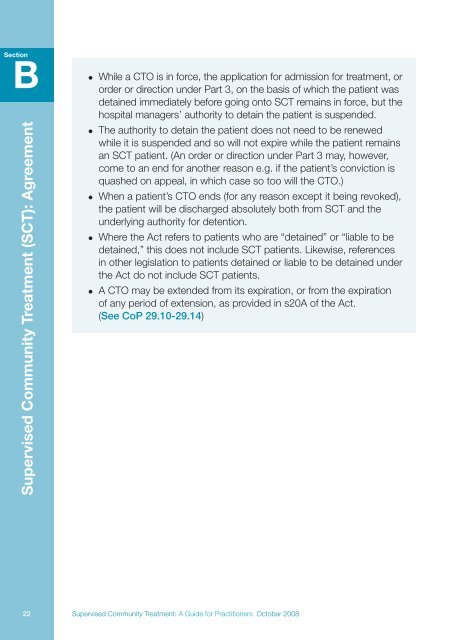Supervised Community Treatment: - Social Perspectives Network
Supervised Community Treatment: - Social Perspectives Network
Supervised Community Treatment: - Social Perspectives Network
Create successful ePaper yourself
Turn your PDF publications into a flip-book with our unique Google optimized e-Paper software.
Section<br />
Section<br />
• While a CTO is in force, the application for admission for treatment, or<br />
order or direction under Part 3, on the basis of which the patient was<br />
detained immediately before going onto SCT remains in force, but the<br />
hospital managers’ authority to detain the patient is suspended.<br />
• The authority to detain the patient does not need to be renewed<br />
while it is suspended and so will not expire while the patient remains<br />
an SCT patient. (An order or direction under Part 3 may, however,<br />
come to an end for another reason e.g. if the patient’s conviction is<br />
quashed on appeal, in which case so too will the CTO.)<br />
• When a patient’s CTO ends (for any reason except it being revoked),<br />
the patient will be discharged absolutely both from SCT and the<br />
underlying authority for detention.<br />
• Where the Act refers to patients who are “detained” or “liable to be<br />
detained,” this does not include SCT patients. Likewise, references<br />
in other legislation to patients detained or liable to be detained under<br />
the Act do not include SCT patients.<br />
• A CTO may be extended from its expiration, or from the expiration<br />
of any period of extension, as provided in s20A of the Act.<br />
(See CoP 29.10-29.14)<br />
C<br />
Setting Up <strong>Treatment</strong>/Care Planning<br />
<strong>Supervised</strong> <strong>Community</strong> <strong>Treatment</strong> (SCT): Agreement<br />
Moving from in-patient care to SCT<br />
Planning the move to the community begins in hospital, where the<br />
managers should have in place a policy for liaising with the local health<br />
service commissioners and providers about the provision of after-care to<br />
patients. The team developing the CPA or equivalent plan should include<br />
representatives of the hospital care team, community mental health and<br />
social services plus the patient’s GP. (See CoP 25.16 – 25.23)<br />
The team should specify:<br />
• which agency (preferably a named individual) will take responsibility<br />
for supplying elements in the package;<br />
• the arrangements for re-assessment and review;<br />
• timescales for the provision of services and review of the package.<br />
After-care planning is the responsibility of the hospital managers,<br />
the Primary Care Trust (PCT) and the Local <strong>Social</strong> Services Authority<br />
(LSSA). At local level, good practice would mean an agreed policy for the<br />
implementation of SCT including amending existing policies such as those<br />
regarding conveying a patient. In practice, much of the detail will be worked<br />
out locally between the teams who have worked with the patient in hospital,<br />
the community team and the relevant agencies.<br />
Neither the Act nor the Code of Practice is prescriptive about the patient’s<br />
management and support in the community, once the CTO is made,<br />
recognising that this will vary considerably depending on the needs of<br />
individual patients and on the availability of local facilities and services.<br />
However, hospital managers, PCTs and LSSAs will wish to revisit local<br />
guidelines within CPA to ensure that points in the Care Plan checklist below<br />
are covered.<br />
Setting Up <strong>Treatment</strong>/ Care Planning<br />
Confidentiality<br />
Throughout the process, patient confidentiality must be taken into account,<br />
with due regard given to balancing this with any risk. There may be situations<br />
where it will be necessary for particular people from other agencies to know,<br />
22 <strong>Supervised</strong> <strong>Community</strong> <strong>Treatment</strong>: A Guide for Practitioners October 2008<br />
October 2008 <strong>Supervised</strong> <strong>Community</strong> <strong>Treatment</strong>: A Guide for Practitioners 23










